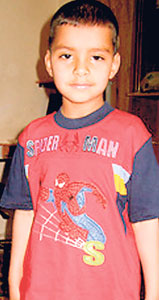BAGHDAD (McClatchy Newspapers) - Iman Kadhim felt the contractions at 2 a.m. on March 20, 2003. The streets of Baghdad were deserted; people cowered in their homes awaiting the threatened U.S. invasion. But the baby wasn't going to wait.
A neighbor with a car gave Iman and her husband a ride to the hospital from their southern Baghdad neighborhood.
Nothing was easy that night. Kadhim heard the baby's first cry before dawn and held him in her arms. Then they heard the first explosions that heralded the arrival of the U.S. military.
 |
| Harb Zaid |
She named him Harb, Arabic for war. His full name, Harb Zaid, translates as Zaid's War.
Neighbours joked that the child named War would only bring damar, or destruction. She worried about him, the boy with a difficult name and an uncertain future.
"I was scared. We didn't know how our life would go forward," she said in her small home in New Baghdad. "We didn't know the future."
War's six years have been scarred by violence - bombings in marketplaces, a foreign occupation, roadside bombs, sectarian killings, massive displacement and flight and a new - and often broken - political system.
On his birthday and the anniversary of the Iraq war, Iman's uncertainty about the future remains that of six years ago. No one knows the future of the nation or War's.
The tension has eased a little, however. The family has taken to calling the little boy with black eyes and a shy demeanor Taqawi, a nickname that has no burdensome meaning. It has no meaning at all, really. His older brother called him Taqawi one day and the nickname stuck.
It's enough that the reminders of war are right outside their door: the rusted coils of concertina wire that snake through the city, the high concrete walls that divide and contain neighborhoods to protect the population, the bullet scarred buildings and the Humvees of the Iraqi and American armies.
War wears Spider-Man T-shirts and loves soccer. But the dangers outside his parents' home often force him to stay inside, where he's glued to a computer screen.
His favorite game is "Grand Theft Auto: Vice City." He hijacks cars, steals motorcycles, shoots pedestrians and runs over bystanders on the street. Digital blood seeps from the bodies.
Most 6-year-olds aren't allowed to play "Grand Theft Auto." It's too graphic. But War has seen real blood.
In 2006 he went with his brother to pick up kebabs when an explosion tore through the market. People ran from the bakery next door burning alive. But he wasn't scared, he said.
His father ran to the market when he heard the blast, barefoot and frightened. A neighbour saw the two boys and pulled them away from the carnage. War recounted the tale to his father, Mohammed Abd Badr, without a trace of fear.
That same year, War sat in the car as his dad drove down the dark streets of his neighborhood one night. A car stopped in front of them, and members of the Shiite militia, the Mahdi army, pulled a man from the trunk of the car and shot him.
They left him on the street and drove away. It was one of thousands of killings by street militias at the height of sectarian violence. The body was one of many that littered the streets like garbage in 2006 and 2007. Often, 50 bodies were found a day. Badr got out of the car to see if it was someone from the neighbourhood. Some boys distracted him briefly and warned him not to approach the body. When he turned, his son was gone.
War looked into the face of the dead Sunni man.
"What are you doing?" his father asked, running up to the little boy.
"Look baba," he said. "Poor man."
He's seen things a child should never see.
His parents try to protect him, but he asks questions.
"If he sees a man with a gun, he asks if he's going to kill someone," Iman, his mother, said as she baked bread in her home. "I don't know yet how it is going to affect him."
She looked at her son and held her daughter, not yet 2, in her arms.
"Our life is destruction, on top of destruction," she said.
"The world is scary," his mother said. "They are children."
On a recent afternoon, War couldn't play outside.
"We're worried about kidnappings. His dad won't let him out," she said.
War has never been to a playground and never been on a picnic. He's never been on a ride at an amusement park.
"He always asks to go out," his mother said. "He tells me, 'We haven't seen anything in our lives. Why are we like prisoners in our house?'" |

